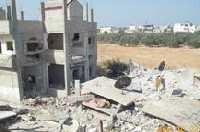24 October 2002

The al-Qassim house, demolished in a controlled explosion October 22, 2002. Left, house of Fayez Dib Barakat. Nine people inside the Barakat house were injured by the explosion, some severely (Photo: Johanna Bjorken/Human Rights Watch, 2002)
The IDF actions violated provisions in international law against collective punishment, the destruction of private property, and the use of force against civilians, Human Rights Watch said.
Israeli soldiers were demolishing a house belonging to the family of an al-Aqsa Martyrs’ Brigade suicide bomber in the al-Salaam district of Rafah, in the Gaza Strip, on the night of October 22. The soldiers had forbidden the civilians from leaving the demolition area and did not offer any assistance to the wounded. Palestinian ambulances coming to the aid of the injured were prevented from entering the area for over half an hour.
“The house should never have been blown up in the first place, but doing so without regard for the safety of local residents is appalling,” said Johanna Bjorken, a Human Rights Watch researcher in Gaza. “There is no justification in international law for the collective punishment of relatives of someone responsible for a criminal act, no matter how heinous that act may have been.”
When contacted by Human Rights Watch, IDF liaison staff in the southern command offered no explanation for why the neighboring residents were refused permission to leave the area. Fifteen-year-old Ahmad Fayiz Barakat, whose house stands only three or four meters from the demolished house, told Human Rights Watch, “They ordered us not to leave, they said our house would not be touched.”
Ahmad’s right leg was broken and both legs were severely lacerated when a door blew in from the blast and landed on him. Nine of the 14 people in the Barakat house at the time of the explosion were still hospitalized on Wednesday. Among the injured Human Rights Watch visited in the hospital was seven-year-old Ehab Barakat, who suffered multiple surface wounds and a broken leg, and who was too frightened to speak. Fifty-year-old Aziza al-Qassir, the most seriously injured, was partially paralyzed due to a fractured vertebra in the neck.
Zuhair Muhammad Barakat, 35, was near the door of a house across the street with his 11-year old daughter Leila at the time of the blast. He had heard his neighbor Fayez call out and ask to leave. “I was staying outside the room, trying to listen to see if they would tell us to evacuate. My daughter was next to me.” The explosion blew in the front of his house, injuring Zuhair and Leila. Zuhair’s three-year-old daughter Ala’a was buried under the rubble, unconscious.
On October 13, 2002, Tawfiq Hussam Breika, a two-year-old boy, was killed after being buried under the rubble of his home in the Zo’rob district of Rafah, when IDF soldiers demolished a neighboring house. As in the al-Salaam district incident, surrounding residents were unable to leave their houses and no warning was given before the explosion. On September 3, six family members were injured when IDF soldiers demolished the house of Fayez `Ali Mohamed Abu Hussein, also in the al-Salaam district.
“There is a very disturbing pattern of innocent civilians being injured or killed during these demolitions,” said Bjorken.
The house demolished on October 22 belonged to the family of an al-Aqsa Martyrs’ Brigade suicide bomber, Mohamad Mahmud Jabar al-Qassir, and the demolition came the day after a suicide bombing in northern Israel, claimed by Islamic Jihad. Human Rights Watch has repeatedly condemned suicide bombings targeting civilians as crimes against humanity, and will be issuing a major report on the subject next week.
In addition to the al-Qassir family house, IDF bulldozers razed three other houses in the same district. Located in close proximity to the Egyptian border, the inhabitants had moved their belongings away approximately one month ago. Salah Hassan Salah al-Shaar showed Human Rights Watch the razed and freshly bulldozed land very near the border where his house, his mother’s house, and the partially destroyed house of Abdelhamid al-Sabkhi had stood the day before. When asked to explain the reason for the destruction of those three houses, the IDF replied that it had had no information that the houses had been destroyed.
According to the Palestinian Center for Human Rights, which closely monitors house destruction in Gaza, Israeli forces have destroyed more than 613 houses in the Gaza strip since October 2000, and a roughly equal number of houses were badly damaged or in need of repair. Although the Israeli authorities often justify such demolitions citing security concerns, they also acknowledge cases in which the destruction has been meted out for purely punitive reasons. Punitive house demolitions violate of the Fourth Geneva Convention and the 1907 Hague Regulations prohibitions on collective punishments and the destruction of private property.
Human Rights Watch called for an independent and impartial investigation into the demolitions that took place on October 22 in Rafah and expressed concern that civilian lives were put in danger by IDF soldiers carrying out actions which are themselves illegal. Attacks that target civilians, use indiscriminate force, or cause disproportionate harm to civilians are also in violation of international humanitarian law.
Related Links: